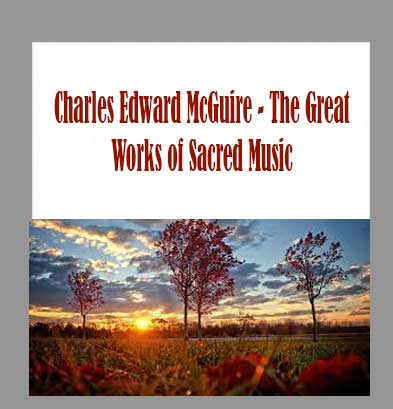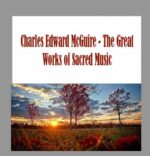Description
Charles Edward McGuire – The Great Works of Sacred Music download, Charles Edward McGuire – The Great Works of Sacred Music review, Charles Edward McGuire – The Great Works of Sacred Music free
Charles Edward McGuire – The Great Works of Sacred Music
The Great Works of Sacred Music
Discover the greatest masterworks of the sacred music tradition, from early church music to the modern era, in this engrossing course taught by a professor of musicology.
LECTURE
Trailer
01:Hallelujah, Amen: The World of Sacred Music
Begin by exploring the contexts in which Western sacred music developed, from its use in religious ritual to its emergence in the concert hall as edifying entertainment. Then encounter three distinct eras in sacred music, hearing excerpts from medieval chant, Handel’s iconic Hallelujah chorus, and Edward Elgar’s The Dream of Gerontius….
43 min
02:From Chant to Early Sacred Polyphony
Trace the roots and origins of sacred music in the Christian West, beginning with the history of chant, a way of singing prayer unaccompanied by instruments. Using diverse musical examples, learn about the structure and styles of chant, and how it evolved into polyphony (music with more than one melody sounding simultaneously)….
41 min
03:The Golden Age of Polyphony
Follow the rise to prominence of both the composer and their patron, observing how sacred music adapted to musical fashions. Explore polyphonic innovations in masses by Guillaume de Machaut and Guillaume Dufay, and in Josquin des Prez’s superlative motet, Ave Maria, gratia plena, one of the first great works of sacred music….
42 min
04:The Age of Reformation: Who Will Sing?
Delve into the religious reformations of the 16th century, and learn how the underlying theological debates shaped sacred music. In particular, grasp how changes in Christian ritual impelled William Byrd, Martin Luther, and Giovanni Pierluigi da Palestrina to pioneer new musical genres and ways to make sung texts more intelligible and communicative….
41 min
05:Sacred Music in a Secular World
By the 17th century, fashionable music began to be equated with secular music. Through studying Claudio Monteverdi’s masterpiece, the Vespro della Beata Virgini, and Heinrich Schütz’s extraordinary Musikalische Exequien, learn how both composers mixed sacred styles with elements from secular genres like opera to create music that was both reverent and modern….
46 min
06:Man and Meaning: Bach’s Cantatas
Bach’s sacred works are perhaps the most celebrated in Western music. Learn about the chorale and cantata, musical forms famously used by Bach. Study his great Cantata No. 80, a beautiful example of Bach’s ingenious blending of the traditional (a chorale by Martin Luther) with the new (elements of recitative and aria)….
45 min
07:Art for Art’s Sake: Bach’s Mass in B Minor
Trace the convoluted compositional history of the magnificent Mass in b minor, and explore Bach’s motives for composing a work with no real practical function. Study how Bach blends older and newer musical styles and recasts musical material from his earlier works in creating a stunning compendium of his own style as a composer….
44 min
08:Handel’s Great Oratorio: Messiah
In the first of two lectures on Handel’s Messiah, study the genre of oratorio, and see how Handel adapted it for his own purposes. Investigate the lives and partnership of Handel and Charles Jennens (the Messiah’s librettist), and discover some of the glorious music from this most beloved of oratorios…
45 min
09:Messiah: From Entertainment to Ritual
Learn about the sources and meanings of the Messiah’s text, and witness the remarkable realization of the text in Handel’s music. Explore Handel’s brilliant compositional ingenuity in the oratorio, and follow the story of how the Messiah rose to become one of the centerpieces of the Western canon of classical music….
44 min
10:Mozart’s Requiem: Praise and Memory
Learn the mysterious and romantic story behind this extraordinary masterwork. Study the musical traits of the Classical Era and the genre of the requiem mass, as ingeniously embodied in Mozart’s music. Then investigate Mozart’s musical “rhetoric,†the technical means through which he portrays the drama of life, grief, and the hope for consolation….
44 min
11:Haydn’s The Creation
Take account of the influence of Handel in this beloved oratorio, and discover the integral role played in its creation by a noble patron and two Viennese institutions. Explore the range of Haydn’s powerful musical language, evoking the Chaos before the Creation, the rising sun, and the triumphant annunciation of the Fourth Day….
45 min
12:God, Man, Music, and Beethoven
In the first of two sublime sacred works by Beethoven, his oratorio Christus am Ölberge, grasp how he uses dramatic expressive means to emphasize the suffering of Christ-suffering with which he personally identified. In the great Missa Solemnis, follow how Beethoven mines the musical past in creating a monumental spiritual vision….
47 min
13:Mendelssohn’s Elijah
In Elijah, Mendelssohn created a compendium of what the oratorio had been, balanced against what it could be. Through listening to compelling excerpts, observe how he includes evocations of Handel, Bach, and Haydn, framed within his own unique musical rhetoric, aiming to compose a work that would outlive him within the canon of sacred music….
44 min
14:Elgar’s The Dream of Gerontius
Learn about the creation of Elgar’s exquisite and very Catholic oratorio, against the musical and religious backdrop of 19th-century Britain. Study how Elgar infused The Dream of Gerontius with Wagnerian operatic elements such as continuous musical narrative, leitmotif, and lavish orchestration, transforming the genre of oratorio into something new….
45 min
15:Sacred Music in the Late 19th Century
Beginning in the late 19th century, composers of sacred music began to question institutional conceptions of faith. Here, study one monumental yet very personal work, Brahms’s Ein Deutsches Requiem; one very anti-monumental expression, Faure’s Requiem; and one that seems monumental, yet ends in a deliberately equivocal manner, Verdi’s Quattro Pezzi Sacri….
47 min
16:Come, All Ye Faithful: Music of Christmas
Conclude with a look at the rich tradition of Christmas music. Explore music designed for yuletide religious services, as well as musical works that became associated with Christmas. Learn how 19th-century composers created a beloved legacy of Christmas carols by resurrecting older ones, writing new ones, and making hybrids of old texts and new music….
46 min
DETAILS
Overview
Discover the greatest masterworks of the sacred music tradition, from the glories of early church music to the monumental works of the modern era, in this insightful journey into Western sacred musical expression. Experience the majesty and beauty of transcendent chorales, cantatas, masses, and oratorios by composers like Bach, Handel, Brahms, and others, and learn how they shaped the current Western canon of music.
About
Charles Edward McGuire
Sacred music is an immense topic. Nearly every culture across the globe includes music for their religious rituals.
Charles Edward McGuire is Professor of Musicology at the Oberlin College Conservatory of Music, where he has taught since 2001. He earned a B.Mus. in musicology from the Oberlin Conservatory and a B.A. from Oberlin College with high honors in history, and received his A.M. and Ph.D. in music from Harvard University. At Oberlin, Professor McGuire teaches music history, including courses on 19th-century music, Ludwig van Beethoven, Mozart’s operas, the symphony in the 19th century, music and narrative, film music history, music in London, and romanticism and medievalism in 19th-century London. Professor McGuire has published extensively on British music, including studies of compositions by Edward Elgar and Ralph Vaughan Williams, as well as works on musical festivals. He is the author of the monographs Music and Victorian Philanthropy: The Tonic Sol-fa Movement; Elgar’s Oratorios: The Creation of an Epic Narrative; and The Historical Dictionary of English Music, which he co-authored with Oberlin colleague Professor Steven Plank. He has presented papers at numerous international musicological conferences, and is a frequent invited speaker for panel discussions and pre-concert talks. Professor McGuire has received a Teaching Excellence Award at Oberlin, as well as being a three-time winner of a Certificate of Distinction in Teaching from Harvard University.
REVIEWSÂ
Cyra
This course is designed to promote ignorance and re-write again history within-truth wrapped up on a thin even no so beautiful blanket to be seen true!
Well-done!?
Salubria1
I like this professor’s serious, calm lecture style. Wonderful combination of biography, history and analysis of the music. I would like another course like this because this is just the tip of the iceberg of sacred music








